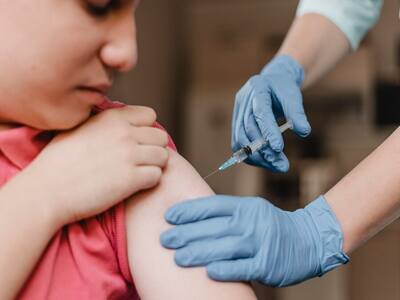
Diseases like typhoid, cholera and Influenza become more rampant during the monsoon season. Dear parents, make sure your child gets the vaccines recommended before monsoon season.
Since we all know ‘prevention is better than the cure‘ and the monsoon season is almost here, it is our utmost duty and responsibility as parents to protect our children and even ourselves from certain illnesses. Some illnesses will become more rampant during the monsoon season. Hence, it is important to immunise children with routine vaccines as per the ‘Indian Academy of Pediatrics’ schedule.
As monsoon approaches, Dr. Varsha Kataria, Pediatrician, Apollo Clinic, Kharadi, Pune, is reminding parents to protect their children from life threatening diseases by ensuring that kids are up to date on their routine vaccinations. He also talked about vaccines that need to be administered to children before monsoon season, when they should be given and more.
Important vaccines children must take before monsoon season
- Diphtheria, Tetanus, and Pertussis (DTaP) Vaccine: This vaccination regime should be up to date as monsoons often bring injuries due to contaminated water and wounds especially in high-risk individuals.
- Typhoid Vaccine: This is the second most commonly advised vaccine. Since typhoid is a water borne disease, it especially prevalent during the monsoon season. These vaccines are advised to be taken if you are traveling to regions with inadequate sanitation or hygiene or has contaminated water supply in the area.
- Cholera vaccine: This vaccine is nowadays recommended depending on your location and prevalence of the disease in your region. Cholera is a water-borne disease caused by ingestion of contaminated water or food. The disease causes high fever, abdominal pain, etc. and if untreated can cause severe complications.
- Influenza (Flu) Vaccine: Influenza viruses tend to circulate more during the monsoon season. It has a secondary peak during the winter season. It is recommended annually to be administered 2-3 weeks before the rains.
Other vaccines recommended for children
- Varicella (Chickenpox) Vaccine: The varicella vaccine protects against chickenpox, a highly contagious viral infection. It is usually given as two doses, the first dose between 12-15 months of age and the second dose between 4-6 years of age.
- Tetanus Vaccine: Monsoon season often brings about an increase in waterborne diseases and injuries due to contaminated water and wounds. Ensuring that your tetanus vaccine is up to date is important, especially if you have a higher risk of exposure to such conditions.
- Hepatitis A or Hepatitis B Vaccines: Hepatitis A or Hepatitis B are viral infections that can spread through contaminated food or water. Vaccination against Hepatitis A or Hepatitis B is recommended for children, especially if they are traveling to areas with a higher prevalence of the disease or in regions with inadequate sanitation or hygiene.
- Measles, Mumps, and Rubella (MMR) Vaccine: The MMR vaccine is typically given in two doses, with the first dose administered around 12-15 months of age and the second dose between 4-6 years of age.
- Polio Vaccine: Polio is a viral infection that can cause paralysis. Vaccination against polio is usually given in a series of doses, including both inactivated poliovirus vaccine (IPV) and oral poliovirus vaccine (OPV).
- Rotavirus vaccines: Rotavirus causes severe diarrhoea and dehydration. Thereby the vaccination for it is recommended for babies at 6th, 10th and 14th
- PCV: Pneumococcal vaccines prevents lung and middle ear infections.
- Meningococcal vaccines: These prevent meningitis and needs to be given to babies at the 9 and 12 months of age.
- Japanese encephalitis vaccine: This vaccine prevents brain inflammation which is seen commonly in North India. It should be given to babies at 12-13 months of age.
5 key elements of the vaccines recommended for children
Antigens: Antigens are the key components of vaccines that mimic the disease-causing agents (such as viruses or bacteria) or their specific proteins. These antigens stimulate the immune system to recognize and mount an immune response against them. They can be inactivated (killed), attenuated (weakened), or parts of the pathogen (subunit or recombinant antigens).
Adjuvants: Adjuvants are substances added to vaccines to enhance the immune response to the antigen. They help increase the body’s immune response, leading to a stronger and longer-lasting protection. Adjuvants can be aluminum salts, oil-in-water emulsions, or other substances.
Preservatives: Some vaccines may contain preservatives to prevent bacterial or fungal contamination of the vaccine vial. Common preservatives used in vaccines include thimerosal (which contains ethylmercury) and phenol.
READ RELATED: What Happens Inside a Woman’s Body When They Drink Too Much Alcohol?
Stabilizers: Stabilizers are added to vaccines to maintain their effectiveness during storage and transportation. They help preserve the vaccine’s integrity and prevent degradation of the antigens. Common stabilizers include sugars (such as sucrose or lactose) and gelatin.
Antibiotics: Some of these vaccines may contain antibiotics such as neomycin, streptomycin, and polymyxin B to prevent the growth of bacteria during the production and storage of the vaccine.
Diluents: Diluents are sterile liquids used to reconstitute or dilute vaccines before administration. They are often included in separate vials or ampules and can be sterile water, saline, or other appropriate solutions.
Total Wellness is now just a click away.
Follow us on
window.addEventListener(‘load’, (event) => {
// $(document).ready(function(){
$(‘#commentbtn’).on(“click”,function(){
(function(d, s, id) { var js, fjs = d.getElementsByTagName(s)[0]; if (d.getElementById(id)) return; js = d.createElement(s); js.id = id; js.src = “//connect.facebook.net/en_US/sdk.js#xfbml=1&version=v2.3”; fjs.parentNode.insertBefore(js, fjs);}(document, ‘script’, ‘facebook-jssdk’));
$(“.cmntbox”).toggle();
});
// });
});






